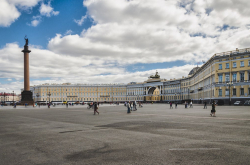The 19th century is rightfully considered the Golden Era of Russian culture, including literature and music. The latter was reinvented by five composers who worked together in St. Petersburg around mid-century. And although not every Russian will be able to list all of their names, their catchy nickname as a group is known to all – the Mighty Handful or the Mighty Five (Могучая кучка – ”Moguchaya kuchka”).
In 1867, Mily Balakirev, their leader, delivered a performance during the All-Russian Ethnographic Exhibit. The prominent critic Vladimir Stasov wrote a review in which he called Balakirev’s group “a small, but mighty handful of Russian musicians” – and the name stuck.
The other members of the Mighty Five were César Cui, Modest Mussorgsky, Nikolai Rimsky-Korsakov, and Alexander Borodin. They joined forces to work towards a very ambitious goal of forming a uniquely Russian style of academic music. Thanks to their immense talent, they succeeded.
On the shoulders of giants
The Russian church didn’t approve of secular music for a long time, so it was practically non-existent until the late 18th century, which is when European academic music became popular among the local aristocracy. However, it took more time to figure out the Russian approach to it.
The first prominent composer who managed to tackle this task was Mikhail Glinka. He wrote the inherently Russian operas A Life for the Tsar (1836) and Ruslan and Lyudmila (1842; based on Alexander Pushkin’s poem of the same name). The members of the Mighty Handful followed in his footsteps.
They drew inspiration from local culture and folklore, striving to make academic music more comprehensible to a wider audience. Through their works, they mixed it with traditional and national features and romanticised them. That’s how Russian classical music as we know it today was born.
See (or listen) for yourself
Writing about music is like dancing about architecture, they say. Now that you know the basics, it’s time to give it a go and find out for yourself what made this handful of composers truly mighty. Some of their most popular works are:
Prince Igor by Alexander Borodin;
The Snow Maiden by Nikolai Rimsky-Korsakov;
Overture to The Mandarin's Son by César Cui;
Rus’ by Mily Balakirev;
Boris Godunov by Modest Mussorgsky.
You also have the chance to hear these and other classical compositions live. Even though they were written over 150 years ago, to this day they are well-known and regularly performed. For academic music lovers from St. Petersburg, we have prepared a list of venues to visit – you can find it here.




